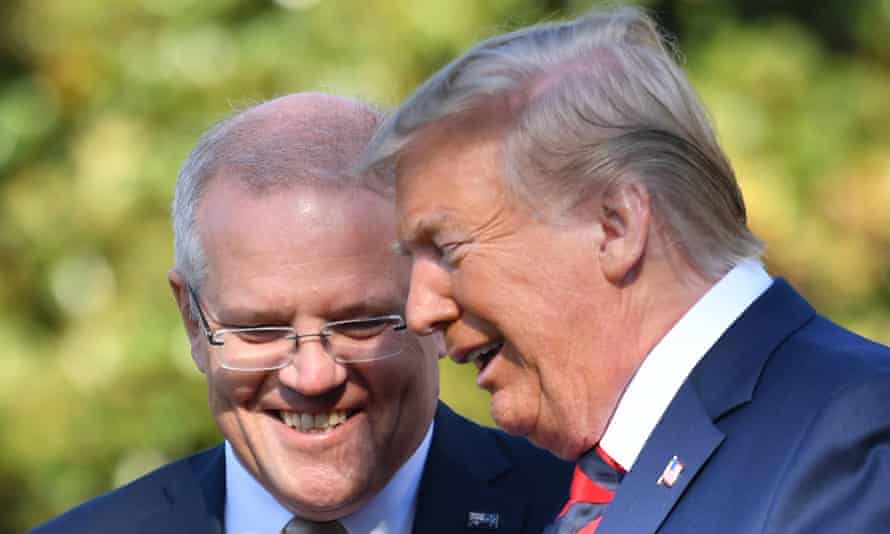Extract from The Guardian
An indifference to truth and transparency and an impunity to maladministration may be Trump’s real legacy at work

Last modified on Thu 21 Jan 2021 10.39 AEDT
There’s an obvious danger in writing any kind of obituary for the Trump presidency: it’s still too early to know the full extent of Donald Trump’s legacy. Joe Biden is this week assuming the presidency of a country that has, at times recently, looked like it is in a state of civil war.
Yet we can safely say this: Trump leaves the White House having inflicted grave political destruction upon the United States. And while we rightly focus on the damage on American democracy and prestige around the world, we’ve felt the consequences of it too in Australia. You’d be in denial to think that Trumpism hasn’t made its way into our political culture.
The start of 2021 has provided ample evidence of that. Unlike many world leaders, and even leading US Republicans like Mitch McConnell, Scott Morrison has declined to condemn Trump’s role in inciting the mob insurrection in Washington DC. While acting prime minister this month, Nationals leader Michael McCormack equated Black Lives Matter protests with the storming of the US Capitol. Both have acquiesced to Coalition colleagues propagating conspiracy theories and anti-vaccination arguments on social media.
Maybe we shouldn’t be surprised. Many on the Australian right have an ideological affinity with Trump and his view of the world. And it’s not just the fringe characters.
Consider, on foreign affairs, the Morrison government’s alignment with the Trump administration’s position towards China. Or Morrison’s use of Trumpian rhetoric in warning about the risks of “negative globalism” and “unaccountable internationalist bureaucracy”.
Consider, too, race – where the Trumpian effect has been even more marked. Trump’s embrace of white supremacists has emboldened many on the Australian right to flirt openly with extremist white identity politics, and to undermine anti-racism.
Remember when Coalition politicians floated a departure from a racially non-discriminatory immigration program, when they called for fast-tracking white South African farmers within Australia’s refugee intake? When 20-odd Coalition senators voted in favour of Pauline Hanson’s motion in the Senate to declare “it’s OK to be white”, a slogan used by white supremacists? Or when the Coalition government, under Malcolm Turnbull, sought to weaken section 18C of the Racial Discrimination Act?
This shift on race hasn’t just occurred in politics. It’s there in our media, where there is a regular airing of extremism and racism.
Most egregiously, News Corp has made it part of its business model to indulge race politics. Sky News has provided a reliable platform to far-right figures (and I’m not even talking here about the network’s nocturnal presenters). The Australian has frequently resembled a poor man’s Breitbart, with its tabloid stable mates contributing their share of race-baiting. Even the ABC has its moments, as when Four Corners not only interviewed Trump strategist Steve Bannon but also flagrantly exonerated him from any racism.
These past four years have exposed a blind spot within Australian media, where many seem to believe that racism has its place within the democratic contest of ideas. There’s a misguided belief, not necessarily in the validity of racism, but in the notion that fascism or white supremacy deserves to have a platform. If only to expose it to the supposed disinfectant of sunlight.
But where has that led us? Such complacency has only created the conditions for extremism. In the US, the example has been clear. In Australia, in the absence of our own civic carnage, we’ve barely recognised the damage that has been done. For example, many commentators seem to have written off the Christchurch terror attack as an aberration from across the Tasman, without any scrutiny of how our own political and media culture radicalised the Australian white supremacist who perpetrated it.
There remain some unresolved effects of the Trump presidency.
If nothing else, Trump has been a figure of transgression and depravity. He broke rules and traditions, he violated standards and norms. He lied and bullied. He revelled in humiliating others. He showed no sense of shame or decency. As critic Carlos Lozada has written in his intellectual history of the Trump era, the man created “a world where bragging is breathing and insulting is talking, where repetition and contradiction come standard, where vengefulness and insecurity erupt at random”.
Yet what if Trump isn’t only a cause of decay but also a symptom of it? After all, it was the American media’s perverse fascination with Trump that helped fuel his run to the White House. It was the Republican party’s cravenness that allowed him to reach it and remain there.
Which brings me to the enduring consequences of Trump. We may have never lived under his presidency here in Australia, but the power of the US remains subtle as it is crude, cultural as well as military. And there remains something in Trump’s perfection of post-truth politics in the world’s most celebrated republic, his imperviousness to scandal after scandal, his efficacy in disrupting the powerful American establishment. Taken together, this presents to all politicians a wicked path of temptation.
If, in our politics, we’ve started to detect an indifference to truth and transparency, an impunity to maladministration, or a partisan captivity to sordid tactics and impulses, we must be doubly on guard. Because that may just be the real legacy of Trump at work.
Tim Soutphommasane is a political theorist and professor at the University of Sydney. A former Race Discrimination Commissioner, his most recent book is On Hate
No comments:
Post a Comment